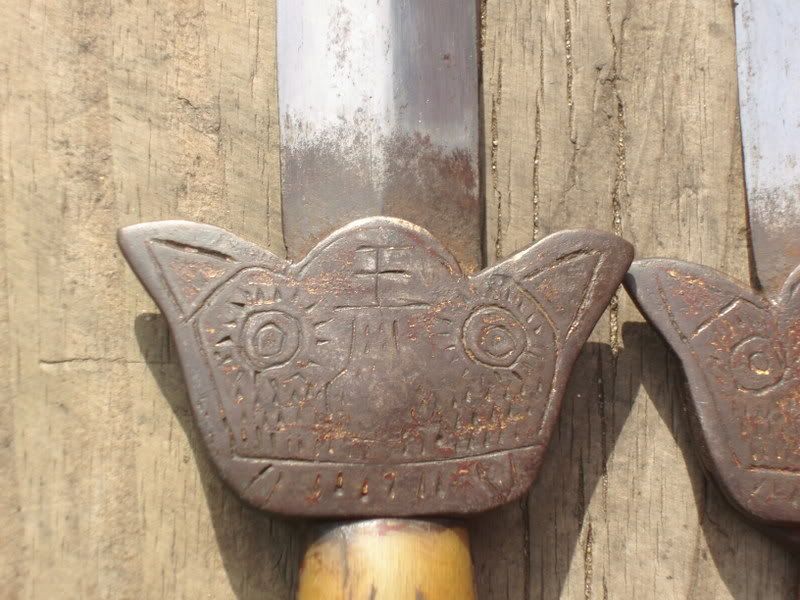Village jian
Posted: Tue Jul 14, 2009 8:28 pm
Phillip Tom suggested I put together some photos showing the diversity of village jian. Here are a few examples, some of which I have posted before, and some of which are new.
Josh
Village jian with guard useful for blocking, catching and hooking.
http://i77.photobucket.com/albums/j65/p ... ord014.jpg
http://i77.photobucket.com/albums/j65/p ... ord016.jpg
Later 19th c. jian. Edges are flat for first third of blade.
http://i77.photobucket.com/albums/j65/p ... 991011.jpg
Jian style guards on zhibeidao.
http://i77.photobucket.com/albums/j65/p ... C_1079.jpg
http://i77.photobucket.com/albums/j65/p ... C_1077.jpg
http://i77.photobucket.com/albums/j65/p ... C_1078.jpg
Clipped tip common on these jian like zhibeidao
http://i77.photobucket.com/albums/j65/p ... C_1081.jpg
And another.
http://i77.photobucket.com/albums/j65/p ... C_1082.jpg
Nice steel on village made zhibeidao.
http://i77.photobucket.com/albums/j65/p ... C_1080.jpg
http://i77.photobucket.com/albums/j65/p ... C_1085.jpg
http://i77.photobucket.com/albums/j65/p ... C_1088.jpg
Assorted jian.
http://i77.photobucket.com/albums/j65/p ... C_1055.jpg
http://i77.photobucket.com/albums/j65/p ... C_1057.jpg
http://i77.photobucket.com/albums/j65/p ... C_1054.jpg
19 c. long handled jian.
http://i77.photobucket.com/albums/j65/p ... 899103.jpg
http://i77.photobucket.com/albums/j65/p ... 899100.jpg
Ming style jian.
http://i77.photobucket.com/albums/j65/p ... 899102.jpg
http://i77.photobucket.com/albums/j65/p ... 899100.jpg
Heavy bladed “militia jian”.
http://i77.photobucket.com/albums/j65/pekhopai/01-1.jpg
http://i77.photobucket.com/albums/j65/pekhopai/00.jpg
Ming style large pommel.
http://i77.photobucket.com/albums/j65/p ... pbiWX2.jpg
Tibetan style guards.
http://i77.photobucket.com/albums/j65/p ... ion343.jpg
http://i77.photobucket.com/albums/j65/p ... ion347.jpg
http://i77.photobucket.com/albums/j65/p ... ion346.jpg
Northern style guards.
http://i77.photobucket.com/albums/j65/p ... ion338.jpg
http://i77.photobucket.com/albums/j65/p ... ion342.jpg
http://i77.photobucket.com/albums/j65/p ... CE5899.jpg
longquan duan jian with village repaired guard and scabbard.
http://i77.photobucket.com/albums/j65/p ... esfiRP.jpg
Josh
Village jian with guard useful for blocking, catching and hooking.
http://i77.photobucket.com/albums/j65/p ... ord014.jpg
http://i77.photobucket.com/albums/j65/p ... ord016.jpg
Later 19th c. jian. Edges are flat for first third of blade.
http://i77.photobucket.com/albums/j65/p ... 991011.jpg
Jian style guards on zhibeidao.
http://i77.photobucket.com/albums/j65/p ... C_1079.jpg
http://i77.photobucket.com/albums/j65/p ... C_1077.jpg
http://i77.photobucket.com/albums/j65/p ... C_1078.jpg
Clipped tip common on these jian like zhibeidao
http://i77.photobucket.com/albums/j65/p ... C_1081.jpg
And another.
http://i77.photobucket.com/albums/j65/p ... C_1082.jpg
Nice steel on village made zhibeidao.
http://i77.photobucket.com/albums/j65/p ... C_1080.jpg
http://i77.photobucket.com/albums/j65/p ... C_1085.jpg
http://i77.photobucket.com/albums/j65/p ... C_1088.jpg
Assorted jian.
http://i77.photobucket.com/albums/j65/p ... C_1055.jpg
http://i77.photobucket.com/albums/j65/p ... C_1057.jpg
http://i77.photobucket.com/albums/j65/p ... C_1054.jpg
19 c. long handled jian.
http://i77.photobucket.com/albums/j65/p ... 899103.jpg
http://i77.photobucket.com/albums/j65/p ... 899100.jpg
Ming style jian.
http://i77.photobucket.com/albums/j65/p ... 899102.jpg
http://i77.photobucket.com/albums/j65/p ... 899100.jpg
Heavy bladed “militia jian”.
http://i77.photobucket.com/albums/j65/pekhopai/01-1.jpg
http://i77.photobucket.com/albums/j65/pekhopai/00.jpg
Ming style large pommel.
http://i77.photobucket.com/albums/j65/p ... pbiWX2.jpg
Tibetan style guards.
http://i77.photobucket.com/albums/j65/p ... ion343.jpg
http://i77.photobucket.com/albums/j65/p ... ion347.jpg
http://i77.photobucket.com/albums/j65/p ... ion346.jpg
Northern style guards.
http://i77.photobucket.com/albums/j65/p ... ion338.jpg
http://i77.photobucket.com/albums/j65/p ... ion342.jpg
http://i77.photobucket.com/albums/j65/p ... CE5899.jpg
longquan duan jian with village repaired guard and scabbard.
http://i77.photobucket.com/albums/j65/p ... esfiRP.jpg


